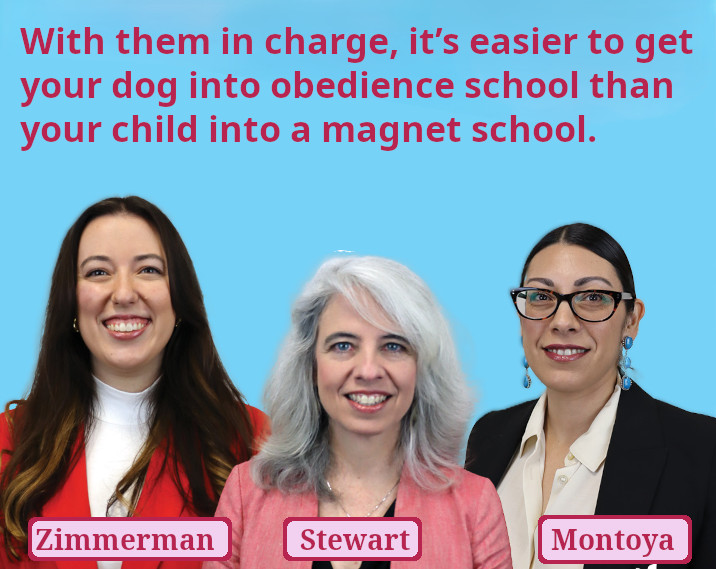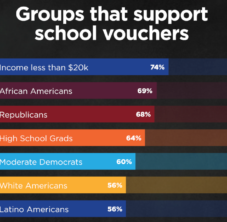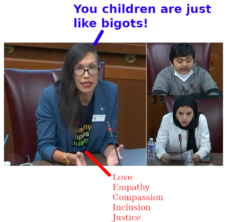Given the results of last month’s Board of Education primaries, in which incumbents or union endorsees (and also Brenda Diaz!) won the top spots, some in the opposition have come to the conclusion that getting the best education for our students is no longer possible through MCPS. People are already talking about “school choice” or “school vouchers.” In this post we’ll clarify these terms, and identify which approach gets our children educated at a reasonable cost.
Residence-based allocation
In a traditional, authoritarian school system, the school board designs the boundary lines for each school. This leads to irrational behavior on the part of affluent parents, who bid up housing prices near favorable schools and in turn deny quality schooling for less advantaged parents. This behavior is so widespread that every single residential listing on realtor.com includes the nearby schools. For example, a 3br/2ba condo currently for sale in Chevy Chase is going for $750,000. Here are the nearby schools.
A similar condo in Montgomery Village is offered for $475,000, and here are the nearby schools.
This situation is heartbreaking. A parent who wants to get a child into the desirable BCC cluster needs to take on crushing debt—if that’s possible. That is no way to allocate a public good. After all, we don’t examine income eligibility to drive down Georgia Avenue. By far, most of our MCPS students benefit from, or suffer from, this allocation model.
Magnet schools
Magnet schools offer special programs for students interested in a particular curriculum. For example, Parkland Magnet School for Aerospace Technology offers an impressive list of coursework for an even more impressive group of students. MCPS makes an effort to offer some magnet schools under its Special Programs.
The problem with MCPS’s management of magnet schools is that there often is not enough room in those programs to satisfy demand. Many of you have children who are on “wait lists” to get into a desired program. This happens whenever demand outpaces supply. In a private setting a group of parents and educators will identify the need and fill it, whereas our school board and teachers’ union are incentivized in directions other than serving the students’ aspirations.
Charter Schools
Charter schools are similar to magnet schools in that they offer curricula tailored to students’ interest. The difference is that charter schools are managed and operated outside of the Board of Education. (Remember Lord Calvert who received a charter from King Charles I to establish Maryland? It’s the same arrangement.)
Charter schools fall into two sub-groups: public chartered schools and private chartered schools. In the public model, the school district actually funds the school but does not operate it. In the private model, a philanthropist funds all or part of the school’s operation. The Bill & Melinda Gates Foundation is a premier funder of charter schools.
The District of Columbia runs public chartered schools, as does Frederick County, Prince George’s, Loudoun, and Fairfax (and possibly others in the region I could not identify). There are no chartered schools in Montgomery County.
School Choice
School choice eliminates the boundary lines entirely, and parents/students can attend any school within the public school system; in some cases, they can attend a public school in another school system. This is a very effective way of reducing the socio-economic discrimination caused by boundary lines, although capacity constraints at a given school limit this benefit. There is no school choice in Montgomery County.
School Vouchers
With school vouchers, the school district grants every student an amount that can be applied to tuition at any school—public, private, secular, or parochial. This is a very good way to giving less advantaged families the access to high-quality private schools. School vouchers have been granted statewide in Vermont, New Hampshire, Louisiana, Florida, and others. There are no school vouchers in Montgomery County.
Home Schooling
Home schooling arguably provides the most flexibility for students and parents to tailor a curriculum. It also demands the most from parents. Furthermore, state law mandates that the curriculum must be reviewed by MCPS or other supervising entity.
Private Schools
The problem with all the foregoing alternatives, from traditional districting to school vouchers to home schooling, is that the BoE and the teachers’ union can still influence the schools’ operations. For example, Laura Stewart can agree to charter a Gates Foundation school only if it hires 100% union teachers and 30% of the class time is dedicated to decolonization. Private schools are immune from these irrelevant considerations.
Educational Savings Accounts and Tax Credits
The county can offer discounts on property taxes for those parents who send children to private schools. At the state level, Educational Savings Accounts (similar to 529 plans) can reduce the income tax burden for parents sending students to private schools.
Nothing is perfect, certainly not an educational setting. Nevertheless, anything on the spectrum from charter schools to home schooling would be an improvement over what MCPS and the teachers’ union is giving us (the parents, the students, the teachers) in return for $7.1 billion plus annual increases. Our task is to determine which of those outcomes to pursue, and then make a plan to achieve it.






